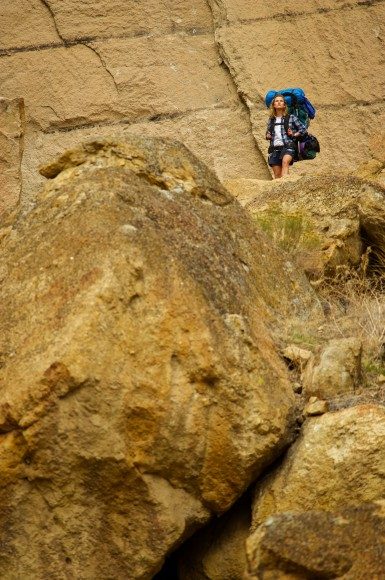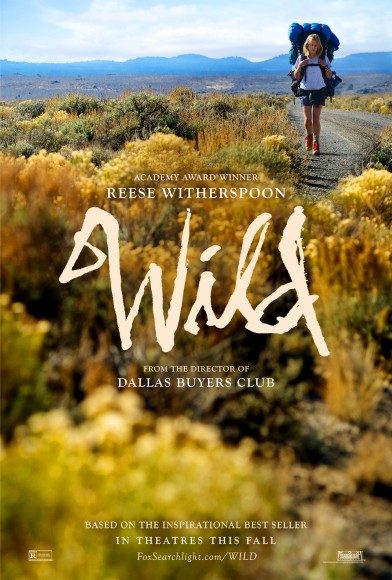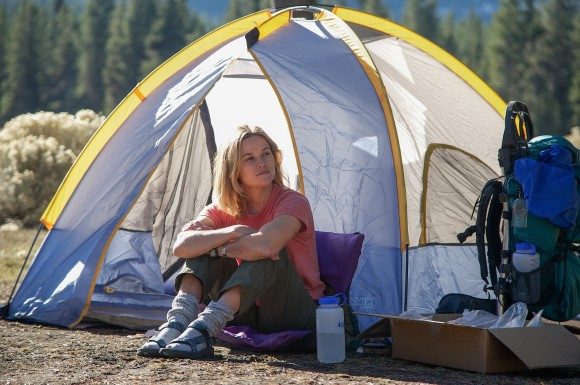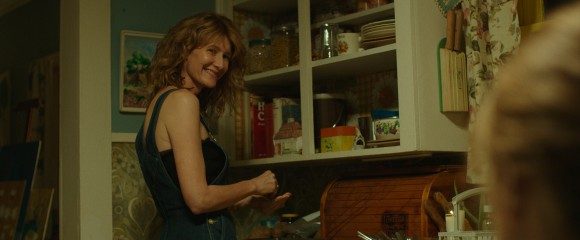You have to admire the ambition it took to think that Wild, a story about a woman solo hiking the 2,600+ mile Pacific Crest Trail as a way to clear her head, would be a good story to tell in a visual medium like film. I mean, yes, the nature vistas on display are breathtaking, but the goal here was to deliver a narrative experience, not a National Geographic special. It’s a crazy thing to attempt, right?
Maybe, but director Jean-Marc Vallee (Dallas Buyers Club) has made it work, creating an elegiac look at the psychological demons and PCT journey of Cheryl Strayed. Complex though the ideas which underlie Wild may be, the movie itself is mostly a stripped down and simple affair that falters only when it tries to do too much that’s concrete, rather than basking in the ephemeral quality of memory called forth by the hard loneliness of life alone on a trail.
As we learn soon enough, Cheryl’s journey, as portrayed by Reese Witherspoon, is one of self-banishment, an attempt to recover from the wounds of a failed marriage and depression over a mother lost too young. The obvious irony is that Cheryl is both running from these elements of her past and yet forced to confront them as she’s left for days on end with nothing but her own thoughts. Thankfully Wild acknowledges this idea up front, so it can move on to exploring the intermingling of Cheryl’s past and present rather than trying to construct some big revelatory moment.
Vallee’s guidance had to be invaluable, but the editing in this movie also deserves notice. Although there are full scenes from Cheryl’s past that interrupt her present on the trail, often we have little glimpses of key images, flitting in and out just as memory might. Cheryl’s memory and her life on the trail are treated almost as co-present, with no visual signifier differentiating the two. It’s one of the best choices the movie could possibly make. It’s a naturalistic take on a film filled with nature, and it’s the perfect stylistic choice to blend the two parts of Cheryl’s existence we’re exposed to. 

Until the film’s final moments, Wild also stays almost entirely free of drawing any of the heavy handed conclusions you hear in the movie’s trailer. The PCT is rejuvenating for Cheryl, but it’s not magical. She’s not well equipped to handle the journey, and she at times falls back into the very habits of mind and action she’s trying to escape. Wild rings true because it chooses to stay simple. The movie is about a particular woman taking a particular journey at a particular time, and for the most part the movie doesn’t try to imagine that it’s showing more than that one moment of her life. Instead, the movie says that life is something happening continually, something that will continue for Cheryl after the movie’s story is concluded. As I’ve alluded to already, the ending becomes unnecessarily didactic, repeating ideas that were already apparent through action alone, but this only detracts a little from the beautiful simplicity of the rest of the film.
I will say that some of my enjoyment of the movie’s reserved style stems directly from an affinity for classical romanticism and an appreciation of the outdoors. Vallee and cinematographer Yves Belanger put the beauty of the Pacific Coast Trail, desert, mountains, forests, and all, on display here, but if you’re not moved by spectacular vistas I can see how the visuals might be a tad boring. Then again, if you’re not moved by the spectacular vistas, you might be dead inside. But even on top of that, watching Cheryl hike the trail had me mentally planning my own trip, and I do appreciate that other viewers might not have exactly that reaction.
On the point of Cheryl herself, Wild is undoubtedly Reese Witherspoon’s show, and she puts on a very brave performance, moving well between the drugged-up, sex-addicted “girl who will say yes to anything” and the more timid and introspective woman on the PCT. It’s not what I’d call a tour-de-force performance of the same caliber as similar isolation movies like Cast Away or All is Lost, but it’s still of a high quality and plenty to carry the movie. Laura Dern is also present in flashbacks as Cheryl’s always-smiling mother, and Thomas Sadoski (though typecast here) shines in his brief screen time as Cheryl’s ex-husband Paul.
The Verdict: 4 out of 5
Wild had to be one of the more difficult shoots to plan for of any movie this year, but Jean-Marc Vallee has guided his cast and crew to a movie that’s one of the more beautifully simple you’re likely to see. If I can be allowed to editorialize for a moment, it’s almost a shame Wild is being pushed so hard into the awards season mold; it doesn’t fit well there. Vallee seems to know his story doesn’t have the sweeping gravitas of the kind of movie usually talked about this time of year. Wild is a smaller story, one which is purposefully near-incomplete. Rather than try to encompass a life, Wild is at its best when content to be descriptive of a particular season. That’s not to ignore its own significance, only to say that Cheryl Strayed’s two months on the Pacific Crest Trail do not comprise her entire life. Does the movie hold your hand on that point a little too much? Yes, especially at the end. But this is an evocative and beautifully photographed movie that shows a compelling tale and mostly avoids the trap of moralizing.



